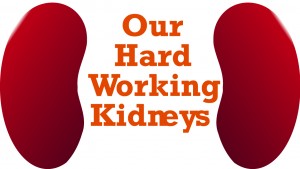Please consult your doctor or regular health physician before following suggestions found in any Sun Day health columns/stories.
MedlinePlus tells us in their March 20, 2014 article that seniors can experience kidney and bladder changes as they grow older (the bladder will be discussed at a later date). The amount of kidney tissue and nephrons – the organ’s filtering units – decrease in number while blood vessels supplying the kidneys can become hardened.
Two types of physicians prevail over the “kidney scene.” One is the urologist or kidney surgeon and the other is the nephrologist or kidney specialist. Gary Curhan, nephrologist at Brigham and Women’s Hospital, discusses chronic kidney disease in “Be Kind to Kidneys” a March, 2014 Nutrition Action Healthletter.
”We know that there is some naturally occurring decline in kidney function with age, but that doesn’t mean that chronic kidney disease is an inevitable part of normal aging,” he said. “Two common conditions — high blood pressure and diabetes – increase the risk of developing kidney disease, and people are more likely to get both if they gain weight as they age.”
Because kidney disease takes many years, even decades, to appear, early treatment of the two common condition diseases can prevent chronic kidney disease from occurring. Hypertension proves to be an extremely strong factor to be considered because it can work two ways.
“If there is some damage to the kidney, you’re much more likely to develop high blood pressure, and high blood pressure (as previously mentioned) can harm the kidney,” Curhan said.
Curhan explains that chronic kidney disease can lead to end-stage kidney disease, where a patient’s survival may depend upon dialysis or a kidney transplant. He goes on to explain that kidney function deterioration can lead to increased risk of fractures (non-activation of Vitamin D) and anemia (difficulty in making red blood cells).
Perhaps more important is the increased risk factor of heart attacks and strokes (non-balance of potassium, sodium, and calcium leading to irregular heart rhythms).
“In fact, that’s what most people with kidney disease die of,” Curhan said.
I can give testimony to the veracity of this statement. My brother-in-law, Rev. Nicholas Katinas, died of a heart attack while having a dialysis treatment. He had undergone these treatments for about two years prior to his death.
As informed in Part 2 of this series, kidney stones are classified as both a post-renal cause and less common chronic cause for renal kidney failure.
As Curhan notes, “Urine is water with a bunch of waste products in it,” so it is important that the waste products stay dissolved. If not, they can grow into crystals that form in the kidney and grow into a stone.
According to Curhan, the risk factor of developing a kidney stone is about 20 percent for a U.S. man and about 10% for a U.S. woman. Diet plays an important role in prevention of the two kinds of stones. Avoidance of spinach and eating less salt is helpful for the calcium oxalate type, as well as the eating of more veggies and fruits. Eating less meat, poultry, and fish is recommended for the uric acid type of stone.
Here are Curhan’s suggestions for lowering your risk of kidney disease:
1. Lose or don’t gain excess weight to avoid the risk of diabetes and hypertension. Gained weight puts an additional strain on the functioning of the kidneys.
2. Minimize sodium and sugar (sucrose and fructose).
3. Fill half your plate with vegetables or fruit.
4. Exercise for 30 to 60 minutes daily.
5. If necessary, take medicine to lower your blood pressure and blood sugar.
6. Eat a diet based on the OmniHeart and DASH studies.
The Costco Connection, March, 2014, also advises:
1. Quit smoking.
2. Know your family history. Begin now to be proactive if kidney problems are in your genes.
If you’ve had a kidney stone:
1. Drink at least eight cups of water or other (non sugar-sweetened) beverages daily.
2. If you take a calcium supplement, take it with food.
3. Limit high oxalate foods such as spinach and rhubarb.
Next Edition: Part 4, Treatment and research





